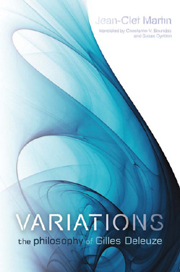Book contents
- Frontmatter
- Contents
- Letter-Preface by Gilles Deleuze
- Preambles
- First Variation: Ethics and Aesthetics
- 1 Battlefield
- 2 Transcendental Empiricism
- 3 Nomadology
- Second Variation: Three Poetic Formulas for Nomadic Distribution
- Third Variation: Multiplicities
- Fourth Variation: Malcolm Lowry, or, the Manifesto of Things
- Postscript to the Anglo-American Edition: What is a Multiplicity?
- Notes
- Bibliography
- Index
2 - Transcendental Empiricism
from First Variation: Ethics and Aesthetics
Published online by Cambridge University Press: 12 September 2012
- Frontmatter
- Contents
- Letter-Preface by Gilles Deleuze
- Preambles
- First Variation: Ethics and Aesthetics
- 1 Battlefield
- 2 Transcendental Empiricism
- 3 Nomadology
- Second Variation: Three Poetic Formulas for Nomadic Distribution
- Third Variation: Multiplicities
- Fourth Variation: Malcolm Lowry, or, the Manifesto of Things
- Postscript to the Anglo-American Edition: What is a Multiplicity?
- Notes
- Bibliography
- Index
Summary
Kant will never stop protecting himself from the molecular furore of the ocean, from the sea overtaken by fog, or from the polar breeze streaked with a multilinear aurora borealis; he will incessantly shield himself from all this inorganic life, even as he reveals the intense nature of this raging cosmic battle. As Michel Serres very poetically maintains, at the dawn of the world, clouds float with fluid edges and tumultuous meteoric storms, from which rare, barely formed islets emerge (Serres 1997: Préface). Order is one of these rare islands that Kant endeavours to transform into an originary continent, a fundamental occurrence and a universal organization. However, Kant fears throughout these spectacular hesitations that expose the ‘deduction of the concepts of understanding’, that understanding will never find the opportunity to use its determining power, in which case, phenomena would never be compliant with the conditions of its unity. Under these conditions, sensible diversity will remain submerged in an aberrant confusion and in a molecular consistency completely removed from causality's schemes.
We rediscover this unusually persistent fear in the first introduction to the Critique of Judgement, where the requirement for a principle of complete connection of everything contained in the totality of phenomena is postulated, in keeping with an ‘ought to be’ of a quasi-moral nature (Kant 1969). In this introductory text, this postulate assumes the appearance of an indispensable prerequisite for the organization of a system of experience. This is why we must admit unconditionally ‘that the unlimited disparity of the empirical laws’ and ‘the heterogeneity of natural forms do not suit nature’.
- Type
- Chapter
- Information
- VariationsThe Philosophy of Gilles Deleuze, pp. 16 - 35Publisher: Edinburgh University PressPrint publication year: 2010

